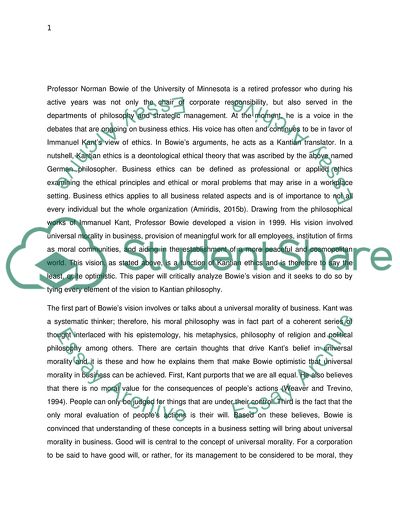Cite this document
(Bowies Vision of a Universal Morality Coursework Example | Topics and Well Written Essays - 1750 words, n.d.)
Bowies Vision of a Universal Morality Coursework Example | Topics and Well Written Essays - 1750 words. https://studentshare.org/social-science/1869386-critically-discuss-bowies-1999-174-vision-of-a-universal-morality-of-business-providing-meaningful-work-for-employees-instituteing-firms-as-moral-communities-and-helping-establish-a-more-cosmopolitan-and-peaceful-world-kantian-capitalism-show-every
Bowies Vision of a Universal Morality Coursework Example | Topics and Well Written Essays - 1750 words. https://studentshare.org/social-science/1869386-critically-discuss-bowies-1999-174-vision-of-a-universal-morality-of-business-providing-meaningful-work-for-employees-instituteing-firms-as-moral-communities-and-helping-establish-a-more-cosmopolitan-and-peaceful-world-kantian-capitalism-show-every
(Bowies Vision of a Universal Morality Coursework Example | Topics and Well Written Essays - 1750 Words)
Bowies Vision of a Universal Morality Coursework Example | Topics and Well Written Essays - 1750 Words. https://studentshare.org/social-science/1869386-critically-discuss-bowies-1999-174-vision-of-a-universal-morality-of-business-providing-meaningful-work-for-employees-instituteing-firms-as-moral-communities-and-helping-establish-a-more-cosmopolitan-and-peaceful-world-kantian-capitalism-show-every.
Bowies Vision of a Universal Morality Coursework Example | Topics and Well Written Essays - 1750 Words. https://studentshare.org/social-science/1869386-critically-discuss-bowies-1999-174-vision-of-a-universal-morality-of-business-providing-meaningful-work-for-employees-instituteing-firms-as-moral-communities-and-helping-establish-a-more-cosmopolitan-and-peaceful-world-kantian-capitalism-show-every.
“Bowies Vision of a Universal Morality Coursework Example | Topics and Well Written Essays - 1750 Words”. https://studentshare.org/social-science/1869386-critically-discuss-bowies-1999-174-vision-of-a-universal-morality-of-business-providing-meaningful-work-for-employees-instituteing-firms-as-moral-communities-and-helping-establish-a-more-cosmopolitan-and-peaceful-world-kantian-capitalism-show-every.


